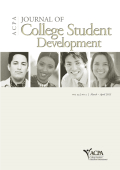
JOURNAL OF COLLEGE STUDENT DEVELOPMENT
Scope & Guideline
Elevating the Student Experience with Empirical Research
Introduction
Aims and Scopes
- Diversity and Inclusion in Higher Education:
The journal consistently emphasizes research that addresses the experiences of underrepresented groups, including racial and ethnic minorities, LGBTQ+ individuals, and students with disabilities. It explores how institutional practices can foster or hinder inclusion and belonging. - Student Development Theories:
A core area of focus is the application and evolution of student development theories. The journal publishes studies that investigate how various developmental frameworks explain the experiences and challenges faced by college students. - Impact of Social Contexts on Student Success:
Research in this journal frequently examines how social, cultural, and familial contexts affect student engagement, retention, and academic success, particularly for marginalized populations. - Mental Health and Well-Being:
There is a significant focus on the mental health and well-being of college students, addressing issues such as stress, anxiety, and resilience, and how these factors influence overall student development. - Innovative Educational Practices:
The journal highlights innovative practices in educational settings, including service learning, peer mentoring, and community engagement, that support student learning and development.
Trending and Emerging
- Intersectionality and Identity:
There is an increasing emphasis on intersectionality, examining how overlapping identities affect students' experiences and development within higher education contexts. This trend is crucial for understanding the multifaceted nature of student identities. - Mental Health and Resilience:
Recent articles show a growing focus on mental health issues and resilience strategies among college students, reflecting rising awareness of mental health challenges exacerbated by the COVID-19 pandemic and societal changes. - Activism and Civic Engagement:
Emerging themes around student activism and civic engagement are becoming prominent, reflecting students' responses to social justice issues and their role in advocating for change within and outside academic settings. - Digital and Social Media Influence:
Research exploring the impact of digital and social media on college student experiences, including issues related to identity formation, community building, and mental health, has gained traction, highlighting the relevance of technology in students' lives. - Non-Traditional Student Populations:
There is a notable increase in research focusing on non-traditional student populations, including veterans, adult learners, and first-generation college students, emphasizing the diverse pathways to higher education.
Declining or Waning
- Traditional Academic Success Metrics:
Research centered on traditional academic success metrics (e.g., GPA, standardized test scores) has diminished in favor of holistic approaches that consider broader student experiences and well-being. - Generic Student Experiences:
There appears to be a waning interest in studies that portray generic student experiences without considering the intersectionality of identities, suggesting a move towards more nuanced explorations of specific demographics. - Static Models of Development:
The use of static models of student development that do not account for the dynamic and evolving nature of student identities and experiences is becoming less common, as researchers seek more adaptable frameworks.
Similar Journals
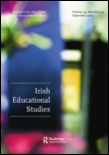
Irish Educational Studies
Transforming Challenges into Opportunities in EducationIrish Educational Studies is a distinguished journal published by Routledge Journals, Taylor & Francis Ltd, focusing on critical issues within the field of education. Established in 1981, the journal has been at the forefront of educational research in Ireland and beyond, examining topics ranging from policy analysis to pedagogical practices that influence the educational landscape. With an impressive impact factor and a recent classification in the Q2 quartile for education, it is recognized for its contribution to the advancement of knowledge in education. The journal is accessible in both print and digital formats, providing a platform for researchers, educators, and practitioners to disseminate and exchange innovative ideas and findings. Operating since its inception, Irish Educational Studies remains committed to fostering scholarly discourse that addresses contemporary challenges and promotes educational equity, making it an essential resource for anyone invested in the field of education.

BULLETIN OF THE COUNCIL FOR RESEARCH IN MUSIC EDUCATION
Fostering Scholarly Inquiry in Music EducationBULLETIN OF THE COUNCIL FOR RESEARCH IN MUSIC EDUCATION, published by UNIV ILLINOIS PRESS, is a premier scholarly journal dedicated to advancing the field of music education through rigorous research and critical discourse. With an ISSN of 0010-9894 and E-ISSN 2162-7223, this journal plays a significant role in disseminating innovative findings and educational practices, ranking in Q1 for Music and Q2 for Education as of 2023. The journal's esteemed position is further highlighted by its Scopus ranking, placing it in the 80th percentile among music-related publications. Covering a time span from 2002 to 2024, it serves as a vital resource for educators, researchers, and graduate students alike. Although the journal does not currently offer open access, its contributions remain crucial in shaping music education research and practice. The BULLETIN not only inspires scholarly inquiry but also enhances the discourse surrounding effective music education methodologies.
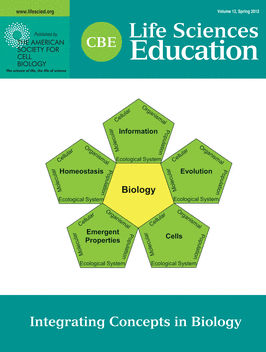
CBE-Life Sciences Education
Bridging Education and Research for a Better Tomorrow in Life Sciences.CBE-Life Sciences Education, published by the American Society for Cell Biology, is a premier academic journal that bridges the fields of education and life sciences. With a robust impact factor reflected in its prestigious Q1 ranking in both Biochemistry, Genetics and Molecular Biology and Education categories in 2023, this journal is pivotal for researchers and educators alike. Its mission is to enhance learning and pedagogy across the biological sciences, fostering innovative educational practices that elevate the teaching and understanding of complex biological concepts. With a convergence of rigorous research and practical insights, CBE-Life Sciences Education serves as an essential resource for professionals and students committed to advancing life sciences education. The journal is available through traditional subscription, ensuring access to a wide array of valuable articles from 2006 to the present and beyond.
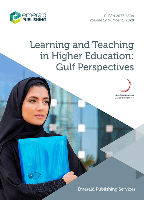
Learning and Teaching in Higher Education-Gulf Perspectives
Fostering Innovation in Learning and Teaching PracticesLearning and Teaching in Higher Education - Gulf Perspectives is a premier Open Access journal published by Emerald Group Publishing Ltd, dedicated to advancing knowledge in the field of education, particularly within the context of higher education in the Gulf region. Since its inception in 2004, the journal has provided a vital platform for scholarly discourse, catering to an audience that includes researchers, educators, and policymakers. With an impressive Scopus ranking, placing it in the top 30% of education journals, and a Q3 quartile classification, it consistently publishes rigorous research and innovative practices that aim to influence educational strategies and contribute to the quality of higher education. The journal supports Open Access, ensuring that research findings are readily available to the wider academic community and the public, thereby fostering informed dialogue and collaboration across disciplines. By bridging local educational insights with global trends, Learning and Teaching in Higher Education - Gulf Perspectives stands as a crucial resource for those committed to improving educational outcomes in the region and beyond.
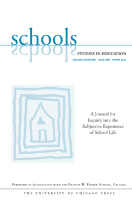
Schools-Studies in Education
Advancing Education Through Rigorous ResearchSchools-Studies in Education is a premier journal published by University of Chicago Press, dedicated to advancing the field of education through rigorous research and thoughtful discourse. With its strong commitment to academic excellence, the journal serves as a vital platform for presenting innovative studies and scholarly articles that address key issues in educational theory, policy, and practice. Though currently not listed as an open-access journal, it offers a wealth of knowledge that is crucial for researchers, educators, and practitioners keen to explore contemporary challenges and developments in the educational landscape. By providing a forum for both empirical studies and theoretical explorations, Schools-Studies in Education remains indispensable for anyone aiming to enrich their understanding and practice in the field of education.

Journal of Student Affairs Research and Practice
Advancing student engagement through research and practice.Journal of Student Affairs Research and Practice is a distinguished publication dedicated to advancing knowledge in the field of higher education student affairs. Published by Routledge Journals, Taylor & Francis Ltd, this journal serves as a vital platform for researchers, practitioners, and educators to explore innovative practices and policies that enhance student development and engagement. With an impact factor reflective of its significance in education, it holds a reputable Q2 category ranking, further underscoring its contributions to the academic discourse surrounding student affairs. The journal invites rigorous research articles, theoretical explorations, and empirical studies that address the complex landscape of student experiences in higher education settings. Operating without an open access model, the journal aims to bridge gaps between research and practice, providing valuable insights for professionals and fostering informed decision-making in student affairs. For those committed to shaping the future of student engagement, the Journal of Student Affairs Research and Practice offers a comprehensive resource for the latest findings and trends in the field, making it essential reading for all stakeholders within the educational community.

RESEARCH IN HIGHER EDUCATION
Connecting research with real-world educational challenges.RESEARCH IN HIGHER EDUCATION is a prestigious, peer-reviewed journal published by SPRINGER, focusing on the diverse and dynamic field of higher education research. Established in 1973, this journal serves as an essential platform for academics, practitioners, and policymakers seeking to advance knowledge in higher education effectiveness, student outcomes, and educational policies. With its impressive impact factor and recognition as a Q1 journal in Education, it ranks #332 out of 1543 in the Scopus category, placing it in the 78th percentile among its peers. Although it does not offer open-access options, the journal's extensive research contributions are invaluable to scholars dedicated to understanding and improving higher education systems globally. Recognized for its rigorous scholarship, RESEARCH IN HIGHER EDUCATION plays a critical role in shaping educational practices and policies, making it an indispensable resource for researchers, educators, and students alike.
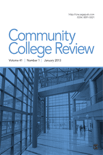
Community College Review
Exploring Innovations in Community College PracticesCommunity College Review, published by SAGE Publications Inc, is a leading peer-reviewed academic journal dedicated to the exploration of community college education, policy, and practice. With its ISSN 0091-5521 and E-ISSN 1940-2325, this esteemed publication contributes significantly to the field of education, attaining a distinguished Q1 classification in the 2023 Education category and ranking #681 out of 1543 in the Scopus Social Sciences - Education rankings, placing it in the 55th percentile overall. Since its inception in 1973, the journal has evolved to address the complex challenges and trends in community colleges, making it an invaluable resource for researchers, practitioners, and policymakers striving to enhance educational outcomes. While not an open-access publication, Community College Review ensures rigorous scholarly standards, fostering a vibrant dialogue on the future direction of community colleges in America. Its insightful articles and critical analyses serve to advance the study and practice of education at these vital institutions.

Tertiary Education and Management
Empowering scholars to navigate the complexities of higher education.Tertiary Education and Management, published by Springer, is a leading peer-reviewed journal that addresses the critical intersection of tertiary education and management practices. With an ISSN of 1358-3883 and an E-ISSN of 1573-1936, this journal has established its reputation as a vital resource within the realms of education and organizational behavior, achieving impressive quartile rankings of Q2 in both fields as of 2023. With its roots dating back to 1995, the journal has evolved to reflect the complexities and challenges faced in higher education and management, providing scholars, educators, and practitioners with innovative insights and research findings. It is indexed within Scopus, holding a rank of #540 in Social Sciences - Education and #123 in Organizational Behavior and Human Resource Management, placing it well within the 65th and 46th percentiles, respectively. Researchers interested in the latest trends and analyses of management practices in the context of higher education will find this journal indispensable for advancing their work and understanding of the dynamic landscape of tertiary education.

Educacion XX1
Connecting Scholars: Uniting Perspectives in EducationEducacion XX1 is a premier academic journal dedicated to the field of education, published by UNIV NACIONAL EDUCACION DISTANCIA in Spain. With an impressive impact factor and recognition in the Q1 category for 2023 in education, this open-access journal has served as a significant platform for innovative research since 2000. The journal aims to share high-quality empirical studies, theoretical discussions, and reviews that address contemporary educational challenges, promoting a deeper understanding of pedagogical practices and policies. As evidenced by its Scopus ranking of #122/1543 in Social Sciences - Education, along with a notable percentile of 92, Educacion XX1 continues to contribute to the scholarly community while fostering global discourse and collaboration. With a diverse range of articles covering various topics and perspectives, this journal is invaluable for researchers, professionals, and students alike, providing insights essential to advancing education in today’s rapidly evolving landscape.